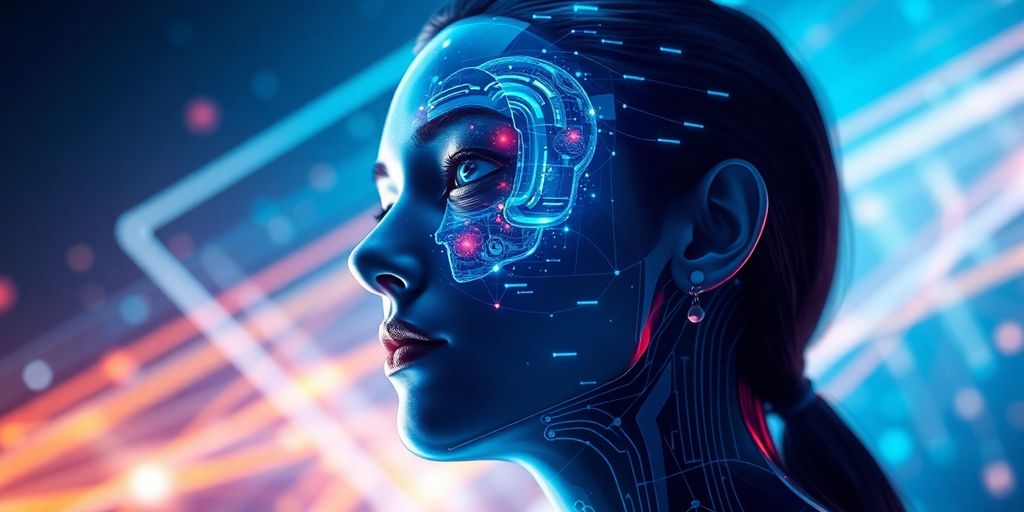Clone Yourself with Delphi AI: Unlocking the Future of Personalization

Imagine having a digital version of yourself that can handle tasks, chat with others, and even make decisions like you. That’s what Delphi AI offers with its digital cloning technology. This tool promises to change how we interact with tech, making it more personal and efficient. With Delphi AI, you can create a clone that mirrors your unique style and voice, ready to assist you in both personal and professional settings.
Key Takeaways
- Delphi AI allows for creating a digital clone that mimics your personal style and voice.
- Digital cloning with Delphi AI can enhance productivity by handling routine tasks.
- Ethical concerns and privacy issues are significant when considering digital cloning.
- Digital clones can be used across various industries, from healthcare to entertainment.
- The future of digital cloning includes more personalized and efficient human-AI interactions.
Understanding the Concept of Digital Cloning
The Evolution of AI in Personalization
AI has come a long way from its early days of basic chatbots. Initially, these systems were all about following simple rules. Now, AI has evolved to replicate human-like thinking and behavior. This shift has been driven by advancements in machine learning and natural language processing. Today, AI clones are not just about mimicking speech but can mirror complex human traits and personalities. They are designed to understand and respond like real people, making interactions feel more natural and personalized.
How Digital Clones Are Created
Creating a digital clone starts with gathering a ton of data. This includes your voice, photos, videos, and even your social media activity. The more data you provide, the better the clone can mimic you. Then, AI uses this information to build a virtual model that acts like you in the digital world. It’s like having a virtual twin that can handle tasks, answer questions, and even have conversations on your behalf.
Ethical Considerations in Digital Cloning
With great power comes great responsibility, and digital cloning is no different. Ethical concerns are front and center when it comes to creating digital replicas. There’s the issue of privacy—how secure is your data? And what about consent? Can a clone be made without someone’s permission? Plus, there’s the risk of misuse, where clones could be used for deception or fraud. These ethical dilemmas need addressing to ensure digital cloning is safe and trustworthy for everyone.
The Role of Delphi AI in Personalization
Features of Delphi AI
Delphi AI stands out as a digital cloning platform that captures the essence of your personal style, voice, and expertise. It’s like having a digital twin that knows you inside out. This platform lets you input various forms of data—books, emails, blogs, you name it—to build a comprehensive profile. The beauty of Delphi AI is its ability to learn and mimic your unique characteristics, making it an indispensable tool in personalization. With features like natural language processing and machine learning, Delphi AI ensures your digital clone is as authentic as possible.
How Delphi AI Enhances User Experience
Delphi AI takes user experience to a whole new level by providing real-time, personalized interactions. Imagine having a clone that can handle your daily tasks, engage in conversations, and even make decisions on your behalf. This isn’t just about convenience; it’s about creating meaningful connections. Users can integrate their digital clones into various platforms, ensuring that their digital self is always up-to-date and reflective of their current preferences and insights.
Case Studies of Delphi AI in Action
Delphi AI has been a game-changer for many professionals. For instance, career coaches are using it to scale personalized one-on-one coaching sessions, allowing them to reach more clients without compromising on quality. Influencers and content creators benefit by maintaining their unique voice across multiple channels, ensuring consistency and authenticity. These real-world applications highlight how Delphi AI is not just a technological marvel but a practical solution for enhancing personal and professional interactions.
Benefits of Using Digital Clones
Improving Efficiency in Daily Tasks
Imagine having a digital version of yourself that can handle all those mundane tasks. Your AI clone can schedule meetings, manage emails, and even pay bills. This means more time for you to focus on what really matters. It’s like having a personal assistant that never sleeps.
- Task Management: Your digital clone can keep track of your to-do list and remind you of deadlines.
- 24/7 Availability: Whether it’s the middle of the night or a holiday, your digital twin is always ready to assist.
- Consistency: Every task is done with the same precision and care, ensuring nothing slips through the cracks.
Enhancing Personal and Professional Relationships
Digital clones can step in to maintain your relationships when you’re busy. They can send birthday wishes, remind you of anniversaries, or just check in with friends and family.
- Personal Touch: Even automated, your clone can mimic your style and tone, making interactions feel genuine.
- Professional Networking: In a work setting, your digital clone can handle routine follow-ups and keep your professional network engaged.
- Legacy Building: Your digital clone can preserve your teachings and maintain your influence over time, ensuring your impact lasts.
Tailoring Content and Services to Individual Needs
With a digital clone, personalization reaches a new level. Your clone learns your preferences and adapts content and services to fit your unique needs.
- Content Curation: It can suggest articles, movies, or music based on your tastes.
- Service Customization: From shopping to dining, your clone ensures everything is tailored just for you.
- Adaptive Learning: Over time, as it gathers more data, your clone becomes more attuned to your habits and preferences, offering more accurate recommendations.
Embracing digital clones means stepping into a future where your digital self can handle the routine, allowing you to focus on innovation and creativity. It’s not just about efficiency; it’s about enhancing every aspect of your life.
Challenges and Risks of Digital Cloning
Privacy Concerns and Data Security
Creating a digital clone involves collecting and storing vast amounts of personal data. This raises significant privacy concerns. Imagine having your entire digital footprint—emails, social media interactions, and even voice recordings—stored somewhere. It’s like having a diary that’s open for anyone to read. The risk of data breaches is real and can lead to identity theft or unauthorized access to your personal information. Protecting this data requires robust security measures, but even the best systems can be vulnerable to attacks.
Potential for Misuse and Abuse
The ability to create realistic digital copies of individuals poses significant threats. These digital clones can be exploited for scams or impersonations, leading to financial and reputational damage. There’s also the danger of using someone’s digital likeness without their consent, which can result in legal battles and ethical dilemmas. The misuse of digital clones in spreading misinformation or engaging in fraudulent activities is a growing concern.
Addressing Public Perception and Trust
Public trust is a major hurdle for digital cloning technology. People are naturally wary of new tech, especially when it involves their personal identity. Building trust requires transparency and clear communication about how digital clones are created and used. Companies need to ensure that they are not only compliant with laws but also respectful of individual privacy and consent. Public education can help demystify the technology, but it must be paired with strict ethical guidelines to prevent misuse and gain public confidence.
Digital cloning is a double-edged sword—while it holds the promise of revolutionizing personalization, it also brings with it a host of challenges that need careful consideration and management.
Future Implications of Digital Cloning Technology

Impact on Various Industries
Digital cloning technology is set to transform numerous industries. In healthcare, AI clones might assist doctors by providing patient data analysis, potentially improving diagnosis accuracy. The education sector could see AI clones acting as personalized tutors, adapting to each student’s learning pace and style. Meanwhile, in entertainment, digital clones could revolutionize content creation, allowing for more personalized and interactive experiences.
The Future of Human-AI Collaboration
The integration of AI clones into everyday life could lead to a new era of collaboration between humans and machines. Imagine AI clones managing mundane tasks like scheduling meetings or sorting emails, freeing up humans to focus on more strategic and creative endeavors. This collaboration could enhance productivity and innovation across various fields.
Predictions for the Next Decade
Looking ahead, the next decade could see AI clones becoming commonplace. These digital assistants might be as ubiquitous as smartphones are today. However, with this integration comes the challenge of ensuring privacy and data security. As AI voice cloning technology advances, it becomes crucial to address concerns about misuse and abuse, including identity theft and fraudulent activities. The future will require robust ethical frameworks to guide the development and use of digital clones.
The potential for digital cloning technology to reshape our world is immense, but it must be approached with caution. Balancing innovation with ethical considerations will be key to unlocking its full potential.
Getting Started with Delphi AI
Setting Up Your Digital Clone
Embarking on the journey to create your digital clone with Delphi AI is an exciting adventure. First things first, you need to gather data that reflects who you are. This can include anything from your video clips, books, podcasts, to transcripts. Think of it like setting up a new social media profile, but way cooler. Delphi AI makes this step a breeze, letting you upload your content with ease, much like using Dropbox. Once you’ve got your data ready, it’s time to dive into the nitty-gritty of setting up your digital clone. Follow the platform’s instructions to start the training process, where your AI begins to learn from the data you’ve provided.
Customizing Your Clone for Optimal Use
Now that your digital clone is in the making, it’s time to tailor it to fit your unique style. This phase is all about customization. Fine-tune the settings to ensure your AI captures your essence. You can tweak its responses, so it communicates just like you would. Think of it as teaching your clone to speak your language. Test it out by generating sample outputs and see how well it mimics your original content. Make adjustments until it feels just right. The goal is to create a digital version of yourself that not only sounds like you but thinks like you too.
Troubleshooting Common Issues
Even with the best tools, things can sometimes go a bit off track. If your AI clone isn’t behaving as expected, don’t worry. Start by checking the data you’ve fed it—sometimes a little tweak here and there can make a big difference. Ensure the settings align with your desired output. If the problem persists, Delphi AI’s support is there to help you out. Remember, creating a digital clone is a process of trial and error. Patience is key, and soon enough, you’ll have a digital twin that’s ready to take on the world.
Real-World Applications of Digital Clones
Digital Clones in Healthcare
Digital clones are making waves in the healthcare industry. Imagine a virtual representation of yourself that can assist doctors in diagnosing illnesses or predicting health issues before they arise. These digital versions can analyze your medical history, lifestyle habits, and even genetic information to provide personalized healthcare insights. This technology can revolutionize patient care by offering tailored treatment plans and monitoring health trends over time.
Education and Training with Digital Clones
In education, digital clones are becoming invaluable tools for personalized learning. Students can interact with their digital counterparts to receive customized tutoring, practice language skills, or even simulate real-world scenarios for better understanding. Teachers can use these clones to offer one-on-one attention to students, adapting lessons to fit individual learning paces and styles. This approach enhances educational outcomes by providing a more engaging and tailored learning experience.
Digital Clones in Entertainment and Media
The entertainment industry is leveraging digital clones to create more immersive experiences. From virtual concerts featuring digital avatars of famous musicians to interactive gaming where players can engage with AI-driven characters mimicking human personalities, the possibilities are endless. These clones can also be used for media production, allowing creators to experiment with new storytelling techniques and character development without the constraints of physical actors.
Digital clones are not just a futuristic concept; they are reshaping how we interact with technology across various fields. As these virtual entities continue to evolve, they promise to bridge gaps between the digital and physical worlds, offering unprecedented levels of personalization and efficiency.
Ethical and Legal Frameworks for Digital Cloning

Current Legal Standards and Regulations
The legal landscape for digital cloning is still evolving, with laws struggling to keep up with rapid technological advancements. Currently, regulations vary significantly by region. In some countries, there are strict guidelines about data privacy and consent, while others are more lenient. A major concern is ensuring that individuals have control over their digital likenesses and that their consent is obtained before any cloning process begins. This is particularly important in areas like voice replication technology, where clear consent and ownership are crucial.
Developing Ethical Guidelines
Ethical guidelines for digital cloning are essential to address the moral implications of creating digital versions of people. These guidelines should focus on transparency, consent, and the potential psychological impacts on individuals. It’s important that users are fully informed about how their data will be used and the extent of the cloning process. There should also be considerations for how these digital clones are used post-creation, ensuring they aren’t exploited or misused.
The Role of Government and Organizations
Governments and organizations play a key role in shaping the ethical and legal frameworks for digital cloning. They must work together to establish international standards that protect individuals’ rights while fostering innovation. Governments can implement regulations that mandate ethical practices, while organizations can develop technologies that prioritize user privacy and data security. Collaborative efforts are essential to build public trust and ensure the responsible use of digital cloning technology.
As digital cloning becomes more prevalent, the need for robust ethical and legal frameworks becomes increasingly urgent. It’s not just about keeping up with technology but ensuring it serves humanity in a responsible way.
Conclusion
So, there you have it. Delphi AI is changing the game when it comes to personalization. Imagine having a digital version of yourself that can handle tasks, chat with people, and even keep your legacy alive. It’s like having a twin who never sleeps. Sure, it sounds a bit sci-fi, but the future is here, and it’s all about making life easier and more connected. Whether you’re a busy exec or just someone curious about tech, Delphi offers a peek into what’s possible. It’s not just about cloning yourself; it’s about enhancing how you interact with the world. So, why not give it a shot? The future of personalization is waiting for you.
Frequently Asked Questions
What is a digital clone?
A digital clone is like a virtual twin that acts and talks like you. It’s made using AI to understand your voice, behavior, and personality.
How does Delphi AI help in creating a digital clone?
Delphi AI helps by using advanced technology to capture your unique style, voice, and expertise. It makes a digital version of you that can interact with others.
Is it safe to use digital clones?
Using digital clones can be safe if you protect your data and follow privacy guidelines. It’s important to be careful about what information you share.
Can a digital clone do everything I can do?
A digital clone can do many tasks like talking to people and making appointments, but it can’t do everything a real person can do.
What are the benefits of having a digital clone?
A digital clone can save time by handling routine tasks, help you stay connected with people, and make your life more efficient.
Are there any risks with digital cloning?
Yes, there are risks like privacy concerns and the possibility of misuse. It’s important to use digital clones responsibly and securely.








Responses